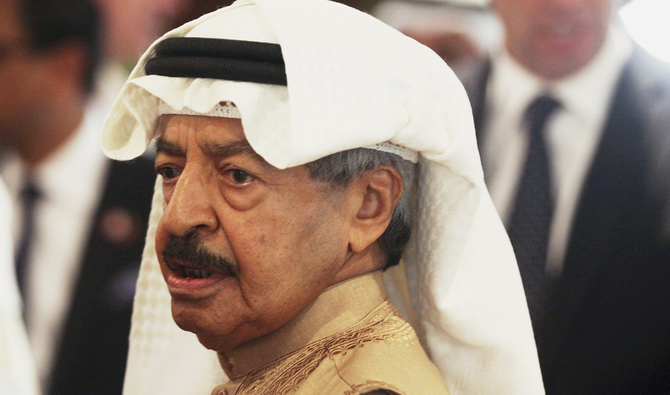
- ARAB NEWS
- 01 Jul 2025

A thousand years from now, the history books will honor the towering founding figures of the modern Arabian Gulf states: Saudi Arabia’s King Abdul Aziz Al-Saud, Sheikh Zayed bin Sultan Al-Nahyan of the UAE, Kuwait’s Sheikh Sabah Al-Ahmad Al-Sabah — and, of course, Prince Khalifa bin Salman Al-Khalifa of Bahrain, who died on Wednesday.
He was the younger brother of the late Emir Isa bin Salman Al-Khalifa, and together they transformed the islands of Bahrain into the thriving modern state we know today: a center for banking, finance, industry, tourism, regional transport and communications.
Thanks to his excellent connections with other Gulf rulers, Prince Khalifa was one of the principal architects of the Gulf Cooperation Council in 1981. He was a tremendous believer in the Arab and Gulf states acting together as a force on the world stage — a true Arab nationalist.
His personal ties with the Shah of Iran were crucial in guaranteeing Bahrain’s sovereignty and regional security, not to mention the significance of the relationships he established with a succession of world leaders.
As one of the last remaining figures from an iconic generation of founders, his passing is deeply felt as a personal loss for Bahrain and the region — but it also also represents the severing of our connections with that great age through the loss of his insights, knowledge and personal memories.
Having held senior public offices since the mid-20th century, Prince Khalifa was appointed prime minister in 1971, when Bahrain gained independence from Great Britain. He remained in the position until his death. As the world’s longest-serving prime minister, at age 84, he was truly one of the region’s great survivors.
The first location in the Gulf region to discover oil, Bahrain in the 1960s and 1970s underwent rapid development and urbanization. It expanded and enriched its educational sector, and revolutionized the nation’s infrastructure and services to meet the demanding requirements of its emerging workforce.
Through the leadership’s far-sighted determination to invest in aviation facilities, Bahrain for many years was the region’s transit hub. Working closely with the late information minister, Tariq Al-Muayyid, Prince Khalifa also championed efforts to cultivate Manama as a regional center for media and communications.
When Lebanon dissolved into civil war during the mid-1970s, the prince played a major role in ensuring that Manama would replace Beirut as the region’s foremost banking center. In the wake of the region’s vast influx of wealth following the 1973 oil boom, Bahrain’s financial sector became the destination of choice for investing and managing these unimaginable riches.
In recent years, Prince Khalifa was an unstinting supporter of figures such as Sheikha Mai Al-Khalifa in their work to expand Bahrain’s cultural and tourism sectors, in the belief that they constitute a cornerstone of the nation’s future prosperity. Bahrain’s nomination this week of Sheikha Mai for the post of secretary-general of the UN World Tourism Organization is richly deserved recognition of these achievements.
As a friend of the French ambassador’s daughter, I accompanied her and her father on a 1969 visit to Bahrain, and during my first encounter with Prince Khalifa I was roped in to help out as a translator — while still of high-school age. When I qualified as a journalist, I continued to meet the prime minister during my frequent visits to Manama, interviewing him many times for various media outlets, and came to consider him a friend.
Although I did not always agree with him during our discussions, his insights always merited careful attention. I found him a true believer in Arab unity and a passionate supporter of Arab causes. Throughout a period when there was a tendency to sit back and wait for the US to solve the region’s problems, Prince Khalifa was firmly of the belief that only the Arab world could truly address the challenges it faced.
During my latter meetings with him, I was struck by the intense hurt he felt at the bitter divisions that have periodically emerged within Bahrain’s social fabric.
In addition to the Palestinian issue, Prince Khalifa was also a close and sympathetic follower of Lebanese developments. As Lebanon emerged from its civil war period, he was always an attentive listener when I spoke to him about challenges and developments there, and he was quick to offer Bahrain’s firm support. In return, I learned a tremendous amount from him about GCC institutions and political culture.
Prince Khalifa’s generation of Gulf leaders shared a distinct vision for rapid national expansion, creating jobs and opportunities for a demanding new generations of citizens. With this region now at a crossroads, as it looks toward a post-oil age, such an ambitious vision has never been more relevant for a new generation of leaders who are taking the region forward to an era of new achievements, and seeking to permanently guarantee Arab independence, identity and sovereignty.
• Baria Alamuddin is an award-winning journalist and broadcaster in the Middle East and the UK. She is editor of the Media Services Syndicate and has interviewed numerous heads of state.